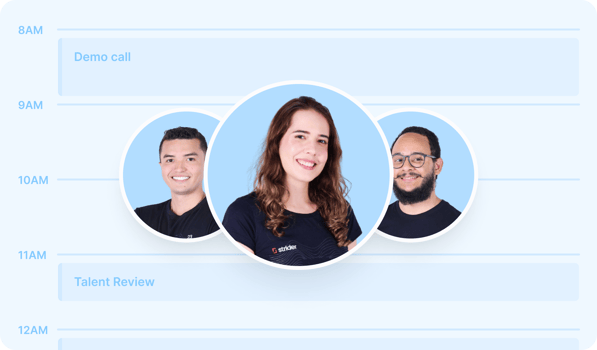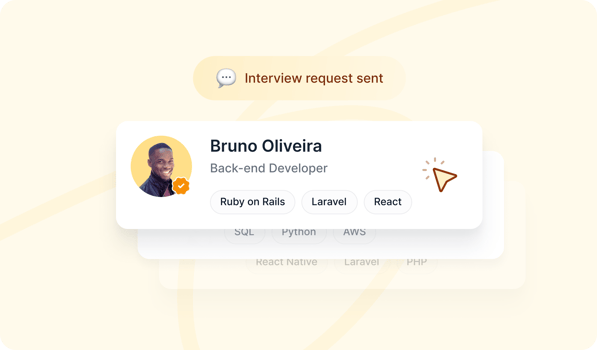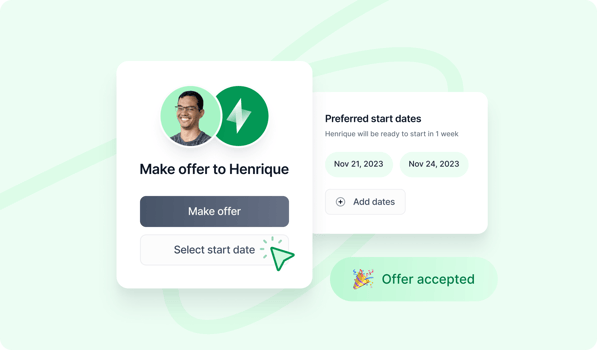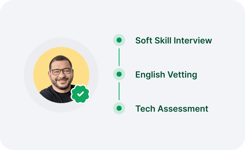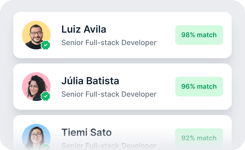Hire Remote Laravel Developers
Laravel is an open-source PHP web application framework that has gained significant popularity among developers due to its simplicity, scalability, and powerful features. It has a robust and expressive syntax, which allows developers to write clean and efficient code. This, in turn, makes it easier to maintain and update codebases, resulting in improved productivity and reduced development costs.
Laravel also includes a range of built-in features and tools that help developers automate routine tasks, such as authentication, routing, and caching, allowing them to focus on more complex and critical aspects of the project.
Hiring a Laravel developer can be crucial for businesses looking to develop web applications quickly, efficiently, and cost-effectively. This guide will walk you through the hiring process of a Laravel developer.
What to Look for When Hiring Laravel Developers?
Hiring a Laravel developer can be challenging, especially if you need to familiarize yourself with the skills and qualifications necessary for the job. It’s important to select Laravel developers with the right skills and attributes to ensure your web application is built efficiently, securely, and effectively.
The right skills allow a developer to work collaboratively in a team environment, communicate effectively with stakeholders, write maintainable and efficient code, troubleshoot issues, and protect against common security vulnerabilities. The following are some skills that you should be looking for.
Technical Skills
A Laravel developer must be proficient in various technical skills, including PHP, Laravel (of course), back-end software development, database management, version control, testing and debugging, and server administration. If you’re looking for a full-stack developer, they should also be proficient with JavaScript and a framework like React.js, Vue.js, or AngularJS. They should also be passionate about writing clean, efficient, and maintainable code and willing to learn and adapt to new technologies and tools. Some of the technical skills required to hire expert laravel developers include:
PHP: Laravel is built on top of PHP, so a developer needs to have a deep understanding of the language, including object-oriented programming (OOP), MVC architecture, and other concepts.
Laravel: A dedicated Laravel developer must have a solid understanding of Laravel's core components, including routing, middleware, Eloquent ORM, blade templating engine, and database migrations.
Front-end software development: Full-stack Laravel developers should be proficient in front-end technologies (HTML, CSS, JavaScript, and JavaScript frameworks).
Database management: A good Laravel developer needs experience working with databases, including MySQL and PostgreSQL. It’s ideal that they also have experience working with SQL itself.
Version control: Knowledge of Git and other version control tools is essential for managing code repositories and collaborating with other developers.
Testing and debugging: A Laravel developer should be familiar with testing and debugging tools, including PHPUnit and Xdebug, to ensure the application is stable and bug-free.
Server administration: Knowledge of server administration, including Linux command line, Apache, and Nginx, can be useful for deploying and maintaining Laravel applications.
Communication Skills
Communication skills are essential for a Laravel developer, including teamwork and collaboration. Laravel developers need to be able to communicate effectively with other members of their team, including other developers, designers, and project managers. Effective communication helps ensure everyone is on the same page, understands their roles and responsibilities, and works towards the same goals.
Problem-Solving Skills
Problem-solving skills are essential when you're looking to hire Laravel experts because they are responsible for building complex web applications that require solving challenging technical problems. Laravel developers need to be able to think critically, analyze complex issues, and come up with innovative solutions. Additionally, Laravel developers must be able to design and implement scalable and efficient web solutions to meet the needs of the application's users.
Laravel Best Practices
Before you hire a laravel developer, make sure they are aware of the following best practices:
Follow the SOLID principles - SOLID stands for Single Responsibility, Open-Closed, Liskov Substitution, Interface Segregation, and Dependency Inversion. These principles help ensure that your code is modular, flexible, and easy to maintain.
Keep your code DRY - Don't Repeat Yourself (DRY) is a principle that focuses on the importance of reusability and reducing redundancy in your code. Use Laravel's built-in features like Blade templates, middleware, and helper functions to avoid repeating code.
Use meaningful variable and function names - Use names that accurately describe the purpose and functionality of your variables and functions. This makes your code more readable and understandable for other developers who might work on the project.
Write unit tests - Writing unit tests helps ensure that your code works as expected and reduces the chances of introducing bugs. Laravel provides built-in support for testing, including PHPUnit and Laravel Dusk.
Use Laravel's built-in features - Laravel provides a wide range of features, including authentication, authorization, routing, and more. Make use of these features to save time and effort and to ensure that your code is secure, efficient, and maintainable.
Top 5 Laravel Developer Interview Questions
If you're looking to hire Laravel programmers, asking the right interview questions to assess their skills and experience is important. By asking these questions, you can identify top Laravel developers with the skills and experience needed to develop high-quality Laravel applications.
What is your experience with the Laravel framework?
This question assesses the candidate's knowledge and experience with Laravel. A good answer should include an overview of the Laravel framework, its features and capabilities, and specific projects the candidate has worked on using Laravel.
How do you optimize the performance of a Laravel application?
This question assesses the candidate's ability to optimize the performance of a Laravel application. A good answer should include techniques such as caching, database optimization, code optimization, and the use of performance monitoring tools. A Laravel programmer must have add-on skills like these to work efficiently with teams and other departments.
How do you handle errors and exceptions in Laravel?
This question assesses the candidate's ability to troubleshoot and debug code. A good answer should include knowing Laravel's error-handling features, such as the exception handler, logging, and debugging tools. For any programming language, bugs and errors are a routine chore. However, dedicated Laravel developers must have a close eye on bugs and errors and know how to fix them.
How do you ensure the security of a Laravel application?
This question assesses the candidate's understanding of web application security and Laravel's built-in security features. A good answer should include knowledge of common security vulnerabilities, how to protect against them, and Laravel's built-in security features, such as authentication, authorization, and encryption. With any coding language, the most elementary problem is the one related to security..
How do you work in a team environment using Laravel?
This question assesses the candidate's ability to collaborate with other developers in a team environment. A good answer should include knowledge of agile development methodologies, version control systems like Git, and communication tools like Slack or Trello. The candidate should also be able to describe their approach to code reviews, testing, and documentation. Knowing the art of working with teams is important because every profession is carried out in collaboration.


